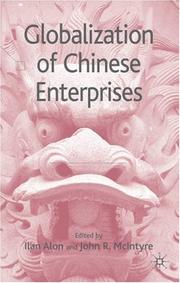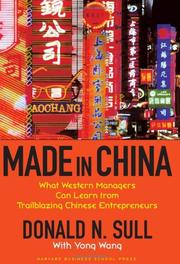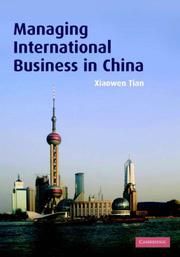| Listing 1 - 10 of 13 | << page >> |
Sort by
|
Book
ISBN: 1780633335 1780633327 1843346052 9781780633329 1306412579 9781306412575 9781843346050 9781780633336 Year: 2012 Publisher: Oxford, England : Chandos Publishing,
Abstract | Keywords | Export | Availability | Bookmark
 Loading...
Loading...Choose an application
- Reference Manager
- EndNote
- RefWorks (Direct export to RefWorks)
This comprehensive study examines the global strategies of multinational corporations (MNCs), the strategic evolution and the categories of their subsidiaries in China based on 150 MNCs. It is the first large-scale project of this nature to be conducted. The research has significant bearing on strategic planning for firms that have set up, are setting up or are planning to establish subsidiaries in China, and the firms that try to compete in the global marketplace. The findings are significant for the West, owing to the current economic crisis and the need to determine if subsidiary expansion
Book
ISBN: 1843345498 1780632762 9781780632766 1306182484 9781306182485 9781843345497 9781843345480 184334548X 9780857091550 0857091557 Year: 2011 Publisher: Oxford : Chandos Publishing,
Abstract | Keywords | Export | Availability | Bookmark
 Loading...
Loading...Choose an application
- Reference Manager
- EndNote
- RefWorks (Direct export to RefWorks)
Despite the overwhelming importance of the Chinese economy to the success of Western economies, there has yet to be an examination of why Western companies have had difficulties in doing business with the Chinese. A significant barrier that companies have difficulty to overcome is the effective communication with their Chinese counter parts. This major impediment is caused by no understanding of the cultural differences between the Chinese and Western business cultures. This book offers the solution to this problem: the bi-cultural personnel.The first book presented by a true b
Business etiquette -- China. --- China -- Commerce. --- China -- Economic policy. --- China --Economic conditions -- 2000-. --- International business enterprises -- China. --- Investments, Foreign -- China. --- Investments, Foreign. --- Investments, Foreign --- Business etiquette --- International business enterprises --- China --- Economic policy --- E-books --- S10/0660 --- China: Economics, industry and commerce--Business guides to China
Book
ISBN: 3662474336 3662474344 Year: 2016 Publisher: Berlin, Heidelberg : Springer Berlin Heidelberg : Imprint: Springer,
Abstract | Keywords | Export | Availability | Bookmark
 Loading...
Loading...Choose an application
- Reference Manager
- EndNote
- RefWorks (Direct export to RefWorks)
This book addresses an essential need felt by many who seek to promote best business practices in China and East Asia – namely the need for culturally appropriate instructional materials (basic information, case studies and ethical perspectives) that will allow managers and entrepreneurs to understand and embrace the challenge of moral leadership in business. In an era characterized by globalization and the increasing importance of the economies of China, India, Japan, and SE Asia, international business ethics must reflect the concerns of the people living and working in this area, the moral and spiritual traditions that have nurtured them, and their specific contributions to sustainable development. This book presents twenty important case studies, taken from newsworthy events of the past few years, in which Asians and others have attempted to respond to this challenge. Each case study has been selected and shaped in order to highlight various aspects of doing business in Asia, starting with basic principles and moving on to the specific responsibilities that businesses have towards their various stakeholders. The authors contend that the best way to appreciate the relevance of Asian moral and spiritual traditions is to determine their specific contribution to virtue ethics, where the ancient traditions of both East and West converge in their focus on the qualities of moral leadership that form the basis of best business practice. Exploring the case studies will enable readers to appreciate the continued relevance of these ethical perspectives in Asian business. Best business practice clearly involves learning to do business and playing the game according to the rules; but the necessity of playing by the rules is not likely to become clear until one takes up the path that leads to a virtuous life in business, developing a moral character chiefly based on integrity.
Business ethics -- China. --- International business enterprises -- China. --- Philosophy --- Philosophy & Religion --- Ethics --- Business ethics --- International business enterprises --- Ethics. --- Professional & Vocational Education. --- Deontology --- Ethics, Primitive --- Ethology --- Moral philosophy --- Morality --- Morals --- Philosophy, Moral --- Science, Moral --- Values --- Professional education. --- Vocational education. --- Education, Vocational --- Vocational training --- Work experience --- Education --- Technical education --- Education, Professional --- Career education --- Education, Higher

ISBN: 9780230515628 0230515622 Year: 2008 Publisher: Basingstoke: Palgrave MacMillan,
Abstract | Keywords | Export | Availability | Bookmark
 Loading...
Loading...Choose an application
- Reference Manager
- EndNote
- RefWorks (Direct export to RefWorks)
S10/0641 --- S10/0430 --- 339.9 --- China: Economics, industry and commerce--Foreign trade and economic relations: since 1989 --- China: Economics, industry and commerce--Investment --- Internationale economie --- Corporations, Chinese --- Globalization --- International business enterprises --- Chinese corporations --- China --- Foreign economic relations. --- Foreign economic relations --- International business enterprises - China. --- Globalization - China. --- China - Foreign economic relations
Book
ISBN: 9782744077265 2744077267 Year: 2013 Publisher: [Montreuil]: Pearson,
Abstract | Keywords | Export | Availability | Bookmark
 Loading...
Loading...Choose an application
- Reference Manager
- EndNote
- RefWorks (Direct export to RefWorks)
Richement documenté, cet ouvrage fait le point de façon équilibrée sur les opportunités et les menaces de l'environnement chinois des affaires. Les managers connaissent en effet mal les transformations récentes du pays. Sait-on par exemple que la Chine compte aujourd'hui plus de 100 parcs scientifiques et techniques et dépense plus que le Japon en R & D? Ces dimensions prometteuses constituent autant de défis à relever pour les entreprises étrangères. Le livre prend appui sur une grande variété de cas concrets : Carrefour, Citroën, Google, etc. À travers la trame du modèle PESTEL, il suit une logique assez chinoise dans sa construction : une première partie plutôt yang, c'est-à-dire le versant ensoleillé de la conduite des affaires en Chine et une seconde partie plutôt yin, où sont examinés les défis sociétaux que les entreprises ne peuvent ignorer. [4e de couv.].
China --- Chine --- Economic policy --- Economic conditions --- Foreign economic relations --- Politique économique --- Conditions économiques --- Relations économiques extérieures --- Business enterprises --- International business enterprises --- Strategic planning --- Business planning --- Business enterprises - China. --- International business enterprises - China. --- Strategic planning - China. --- Business planning - China. --- China - Economic policy - 2000 --- -China - Economic conditions - 2000 --- -China
Book
ISBN: 3642182089 3642182097 Year: 2011 Publisher: Berlin ; Heidelberg : Springer-Verlag,
Abstract | Keywords | Export | Availability | Bookmark
 Loading...
Loading...Choose an application
- Reference Manager
- EndNote
- RefWorks (Direct export to RefWorks)
Due to the rapidly changing nature of the labor market and the laws that govern it in China, it can be very difficult for foreign investors and managers to understand how to manage human resources on the mainland. Specifically designed to cover the most important issues relating to managing a Chinese workforce, this guide details the HR issues that both local managers in China and investors looking to establish a presence on the mainland should know. China Briefing’s guides are leaders in their field, providing practical and pragmatic legal and tax information to foreign investors in the People's Republic of China. They will interest all business people, lawyers, accountants and academics working in the field.
International business enterprises -- China -- Management. --- Labor laws and legislation -- China. --- Management -- China. --- Personnel management -- China. --- Strategic planning -- China. --- Management --- Business & Economics --- Management Theory --- Human capital --- Personnel management --- Business. --- Personnel management. --- Globalization. --- Markets. --- Business and Management. --- Emerging Markets/Globalization. --- Human Resource Management. --- Corporations --- Employment management --- Human resource management --- Human resources management --- Manpower utilization --- Personnel administration --- Public administration --- Employees --- Employment practices liability insurance --- Supervision of employees --- Global cities --- Globalisation --- Internationalization --- International relations --- Anti-globalization movement --- Public markets --- Commerce --- Fairs --- Market towns

ISBN: 1591397154 9781591397151 Year: 2005 Publisher: Boston (Mass.): Harvard Business School Press,
Abstract | Keywords | Export | Availability | Bookmark
 Loading...
Loading...Choose an application
- Reference Manager
- EndNote
- RefWorks (Direct export to RefWorks)
65.01 <510> --- internationaal zakendoen --- China --- ondernemen --- management --- 305.81 --- 338 --- 658.0 --- 658.018 --- Internationaal management --- Ondernemerschap --- Change talenten leidinggeven leiderschap coachen adviseren samenwerken gedrag belonen success --- Methods and methodology. Theory and practice of organization--China --- interculturele communicatie, intercultureel zakendoen, cultuurverschillen en interculturaliteit --- Business enterprises --- Entrepreneurship --- International business enterprises --- Economic conditions --- Entrepreneurship - China --- Business enterprises - China --- International business enterprises - China --- China - Economic conditions - 2000 --- -Business enterprises
Book
ISBN: 080478454X 0804786127 9780804786126 9780804784542 Year: 2013 Publisher: Stanford, Calif. : Stanford University Press,
Abstract | Keywords | Export | Availability | Bookmark
 Loading...
Loading...Choose an application
- Reference Manager
- EndNote
- RefWorks (Direct export to RefWorks)
Chinese Labor in a Korean Factory draws on fieldwork in a multinational corporation (MNC) in Qingdao, China, and delves deep into the power dynamics at play between Korean management, Chinese migrant workers, local-level Chinese government officials, and Chinese local gangs. Anthropologist Jaesok Kim examines how governments, to attract MNCs, relinquish parts of their legal rights over these entities, while MNCs also give up portions of their rights as proxies of global capitalism by complying with local government guidelines to ensure infrastructure and cheap labor. This ethnography demonstrates how a particular MNC struggled with the pressure to be increasingly profitable while negotiating the clash of Korean and Chinese cultures, traditions, and classes on the factory floor of a garment corporation. Chinese Labor in a Korean Factory pays particular attention to common features of post-socialist countries. By analyzing the contentious collaboration between foreign management, factory workers, government officials, and gangs, this study contributes not only to the research on the politics of resistance but also to how global and local forces interact in concrete and surprising ways.
Business anthropology - China - Qingdao. --- Business anthropology -- China -- Qingdao -- Case studies. --- Clothing factories - China - Qingdao. --- Clothing factories -- China -- Qingdao -- Case studies. --- Corporations, South Korean - China - Qingdao - Sociological aspects. --- Corporations, South Korean -- China -- Qingdao -- Sociological aspects. --- Industrial relations - China - Qingdao. --- Industrial relations -- China -- Qingdao -- Case studies. --- International business enterprises - China - Qingdao - Sociological aspects. --- International business enterprises -- China -- Qingdao -- Sociological aspects. --- Labor and globalization - China - Qingdao. --- Labor and globalization -- China -- Qingdao -- Case studies. --- Sweatshops - China - Qingdao. --- Sweatshops -- China -- Qingdao -- Case studies. --- Corporations, South Korean --- International business enterprises --- Clothing factories --- Sweatshops --- Industrial relations --- Labor and globalization --- Business anthropology --- Management --- Business & Economics --- Industrial Management --- Sociological aspects --- Sociological aspects. --- Sweat shops --- Sweated industries --- Sweating system --- Globalization and labor --- Business enterprises, International --- Corporations, International --- Global corporations --- International corporations --- MNEs (International business enterprises) --- Multinational corporations --- Multinational enterprises --- Transnational corporations --- South Korean corporations --- Capital and labor --- Employee-employer relations --- Employer-employee relations --- Labor and capital --- Labor-management relations --- Labor relations --- Garment factories --- Business --- Corporate anthropology --- Industrial anthropology --- Management anthropology --- Private sector anthropology --- Public sector anthropology --- Anthropological aspects --- Factories --- Anti-sweatshop movement --- Globalization --- Business enterprises --- Corporations --- Joint ventures --- Employees --- Anthropology --- Corporate culture --- E-books --- Labor --- Labor and laboring classes --- Manpower --- Work --- Working class --- K9418.90 --- S11/0830 --- S10/0583 --- S11/1215 --- S11/0534 --- Korea: Economy and industry -- labor and employment -- migrant labor, foreign workers --- China: Social sciences--Labour conditions and trade unions: since 1949 --- China: Economics, industry and commerce--Management of private enterprises --- China: Social sciences--Works on national minorities and special groups: since 1949 --- China: Social sciences--Class studies

ISBN: 0312121318 Year: 1994 Publisher: New York St. Martin's Press
Abstract | Keywords | Export | Availability | Bookmark
 Loading...
Loading...Choose an application
- Reference Manager
- EndNote
- RefWorks (Direct export to RefWorks)
Firms and enterprises --- China --- S10/0655 --- S10/0660 --- International business enterprises --- -Investments, Foreign --- -Joint ventures --- -Negotiation in business --- -Business --- Management --- Adventures, Joint --- Joint adventures --- Joint undertakings --- Ventures, Joint --- Partnership --- Capital exports --- Capital imports --- FDI (Foreign direct investment) --- Foreign direct investment --- Foreign investment --- Foreign investments --- International investment --- Offshore investments --- Outward investments --- Capital movements --- Investments --- Business enterprises, International --- Corporations, International --- Global corporations --- International corporations --- MNEs (International business enterprises) --- Multinational corporations --- Multinational enterprises --- Transnational corporations --- Business enterprises --- Corporations --- Joint ventures --- China: Economics, industry and commerce--Joint ventures --- China: Economics, industry and commerce--Business guides to China --- Government policy --- -S10/0655 --- -China: Economics, industry and commerce--Joint ventures --- -Firms and enterprises --- Investments, Foreign --- Negotiation in business --- Investments [Foreign ] --- Joint ventures - Government policy - China. --- International business enterprises - China. --- Negotiation in business - China.

ISBN: 9780521861885 9780521679930 9780511810558 9780511279423 0511279426 0511276435 9780511276439 0511278829 9780511278822 0511810555 9786610850655 6610850658 0521861888 0521679931 9780511569081 0511569084 1107713927 1280850655 0511277652 0511278241 Year: 2007 Publisher: Cambridge: Cambridge university press,
Abstract | Keywords | Export | Availability | Bookmark
 Loading...
Loading...Choose an application
- Reference Manager
- EndNote
- RefWorks (Direct export to RefWorks)
With the rise of China in the world economy, investors from all over the world are moving to explore business opportunities in this market. Managing international business in a transition economy like China is a daunting challenge. Tian presents a practical guide to major managerial issues faced by foreign investors in the China market including strategic management of Guanxi, entry mode selection, alliance management, negotiation with Chinese partners, human resource management, marketing management, protection of intellectual property rights, and corporate financial management. These issues are analyzed in the light of relevant theoretical models of international business, with reference to current management practices of transnational corporations operating in China. With up-to-date case studies, questions for discussion and recommended readings at the end of each chapter, this book can be used as a textbook for postgraduate programmes in international business or other management disciplines, and as a textbook for executive training programmes.
International business enterprises --- Investments, Foreign --- Joint ventures --- Management --- 282 Landbeschrijvingen (sociaal-economisch-cultureel) --- China --- S10/0660 --- S10/0580 --- China: Economics, industry and commerce--Business guides to China --- China: Economics, industry and commerce--Management of enterprises (general, theories) --- Business enterprises, International --- Corporations, International --- Global corporations --- International corporations --- MNEs (International business enterprises) --- Multinational corporations --- Multinational enterprises --- Transnational corporations --- Business enterprises --- Corporations --- Adventures, Joint --- Joint adventures --- Joint undertakings --- Ventures, Joint --- Partnership --- Capital exports --- Capital imports --- FDI (Foreign direct investment) --- Foreign direct investment --- Foreign investment --- Foreign investments --- International investment --- Offshore investments --- Outward investments --- Capital movements --- Investments --- Business, Economy and Management --- Business Management --- International business enterprises - China - Management - Case studies --- Investments, Foreign - China - Case studies --- Joint ventures - China - Management - Case studies
| Listing 1 - 10 of 13 | << page >> |
Sort by
|

 Search
Search Feedback
Feedback About UniCat
About UniCat  Help
Help News
News